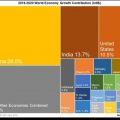Riding through London in the back of a Rolls-Royce in the early 1980s, 12-year-old Jacob Rees-Mogg proudly declared his ambitions: “I’ve always wanted to be rich.”
The besuited youngster, who was already an ardent supporter of then-prime minister Margaret Thatcher, calmly explained to a French reporter that he had put his plans in motion five years earlier when he invested a £50 inheritance in the shares of utility firm GEC.
Now a millionaire many times over, the newly installed business secretary could be set for a further windfall from the potential sale of Somerset Capital Management, the investment firm he helped launch in 2007.
It emerged on Thursday that talks were under way to sell Somerset, as its co-founder and chief executive Dominic Johnson prepares to follow in Rees-Mogg’s footsteps and shift into a career in politics.
A sale could result in a multimillion pound payout for the business minister, who stopped receiving wages from the firm in 2019, but remains an equity-holding member. His shareholding is understood to be in the low teens, though this is information is not publicly available. In 2018, during inconclusive merger talks with a US firm, Somerset is believed to have been valued at between £70m and £100m. At the time, it managed $10bn of assets on behalf of a combination of individual and institutional investors, though that sum has since dropped to $5bn.
Media reports suggest the staunch Brexiter had pocketed at least £7m in dividends from Somerset since the EU referendum in 2016, and before he stopped taking a salary, Rees-Mogg received about £15,000 a month from the firm on top of his MP’s pay.
Somerset has traditionally invested in listed companies based in emerging markets including China, Korea, India and Mexico, and is believed to have benefited from the drop in the value of the pound after the Brexit vote as its holdings were overseas.
His payouts from Somerset have continued, despite being a so-called sleeper shareholder who no longer plays a role in advising on the investment strategy or the running of the business. Rees-Mogg reportedly received dividends worth at least £600,000 last year, according to the Times, though that was down from £800,000 a year earlier due to a 35% slide in the profits, linked in part to an emerging markets sell-off.
Analysis of the firm’s investments, based on data provided by research agency Morningstar, shows holdings in major Chinese companies including Alibaba, and Tencent, which runs social media platform WeChat and holds stakes in Spotify, Tesla, Snapchat, Monzo and Reddit.
There are also stakes in Samsung, and chip maker Taiwan Semiconductor Manufacturing which is reportedly in line to supply Apple’s iPhones and Macs next year.
Somerset has also taken a punt on Infosys – the global IT company founded by Indian billionaire NR Narayana Murthy, the father-in-law of former chancellor Rishi Sunak – as well as Taco Bell-owner Yum China, and beer companies Budweiser and Heineken.
The data also shows the firm holds small stakes in a handful of Russian firms including search engine Yandex, online recruitment company HeadHunter, and TCS Holding Group, which in turn owns the country’s second-largest credit card issuer, Tinkoff Bank.
The cabinet minister, whose father, William Rees-Mogg, was editor of the Times throughout the 1970s, previously undertook to reduce his stake in Somerset. He also holds a sprawling property portfolio including two flats in Pall Mall, owned by his company Saliston, as well as a former schoolhouse near Gournay Court – a Grade II*-listed Somerset mansion inhabited by his mother – and a bungalow in Midsomer Norton.
Before setting up Somerset, Rees-Mogg worked for hedge funds in Hong Kong and Mayfair, and is one of the richest ministers in prime minister Liz Truss’s cabinet.
Spear’s Wealth Management estimated in 2019 that his net worth was “well over £100m”, a figure which also accounted for the expected inheritance of his wife, Lady Helena de Chair, whose mother was said to have a £45m fortune.
Oliver Crawley, a partner at Somerset, stressed that Rees-Mogg had not had played a role in any of the firm’s investment decisions for over a decade. “Any partnership interest in Somerset is held in abeyance in accordance with the ministerial code,” he added.
Rees-Mogg, who was contacted by the Guardian via the business department, did not immediately respond to requests for comment.

